Deck 7: Applications of Trigonometry
Question
Question
Question
Question
Question
Question
Question
Question
Question
Question
Question
Question
Question
Question
Question
Question
Question
Question
Question
Question
Question
Question
Question
Question
Question

Unlock Deck
Sign up to unlock the cards in this deck!
Unlock Deck
Unlock Deck
1/25
Play
Full screen (f)
Deck 7: Applications of Trigonometry
1
Find (a) the dot product of the two vectors and (b) the angle between the two vectors.  and
and 
A)
B)
C)
D)
E)
 and
and 
A)

B)

C)

D)

E)

C
2
Given that  , find the number.
, find the number. 
A) 13
B) 10
C) -7
D) 25
E) 5
 , find the number.
, find the number. 
A) 13
B) 10
C) -7
D) 25
E) 5
C
3
Shown in the figure is a plan for the top of a wing of a jet fighter, where  feet and
feet and  feet.
feet. 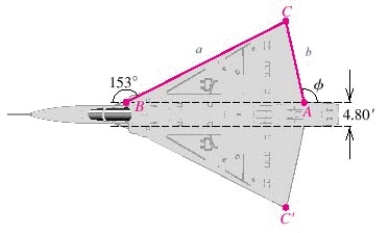 Approximate angle
Approximate angle  .
.
A)
B)
C)
D)
E)
 feet and
feet and  feet.
feet.  Approximate angle
Approximate angle  .
.A)

B)

C)

D)

E)

D
4
Shown in the figure is a plan for the top of a wing of a jet fighter, where  feet and
feet and  feet.
feet. 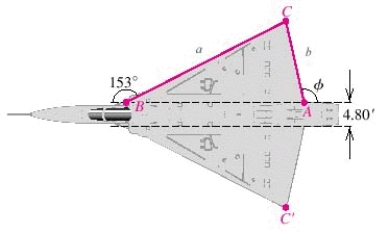 Approximate the area of triangle ABC.
Approximate the area of triangle ABC.
A) 453.3 ft 2
B) 452.9 ft 2
C) 905.7 ft 2
D) 453.5 ft 2
E) 453.1 ft 2
 feet and
feet and  feet.
feet.  Approximate the area of triangle ABC.
Approximate the area of triangle ABC.A) 453.3 ft 2
B) 452.9 ft 2
C) 905.7 ft 2
D) 453.5 ft 2
E) 453.1 ft 2

Unlock Deck
Unlock for access to all 25 flashcards in this deck.
Unlock Deck
k this deck
5
A rhombus has sides of length 100 centimeters, and the angle at one of the vertices is 70  . Approximate the lengths of the diagonals to the nearest tenth of a centimeter.
. Approximate the lengths of the diagonals to the nearest tenth of a centimeter.
A) 125.5 cm , 164.6 cm
B) 114.7 cm , 163.8 cm
C) 124.9 cm , 164.6 cm
D) 124.9 cm , 163.6 cm
E) 34.7 cm , 34.7 cm
 . Approximate the lengths of the diagonals to the nearest tenth of a centimeter.
. Approximate the lengths of the diagonals to the nearest tenth of a centimeter.A) 125.5 cm , 164.6 cm
B) 114.7 cm , 163.8 cm
C) 124.9 cm , 164.6 cm
D) 124.9 cm , 163.6 cm
E) 34.7 cm , 34.7 cm

Unlock Deck
Unlock for access to all 25 flashcards in this deck.
Unlock Deck
k this deck
6
A helicopter hovers at an altitude that is  feet above a mountain peak of altitude 5,184 feet, as shown in the figure. A second, taller peak is viewed from both the mountaintop and the helicopter. From the helicopter, the angle of depression is
feet above a mountain peak of altitude 5,184 feet, as shown in the figure. A second, taller peak is viewed from both the mountaintop and the helicopter. From the helicopter, the angle of depression is  , and from the mountaintop, the angle of elevation is
, and from the mountaintop, the angle of elevation is  .
. 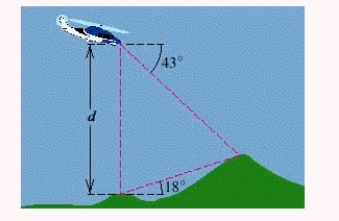 Approximate the altitude of the taller peak.
Approximate the altitude of the taller peak.
A) 5,437 ft
B) 5,439 ft
C) 5,441 ft
D) 4,931 ft
E) 5,443 ft
 feet above a mountain peak of altitude 5,184 feet, as shown in the figure. A second, taller peak is viewed from both the mountaintop and the helicopter. From the helicopter, the angle of depression is
feet above a mountain peak of altitude 5,184 feet, as shown in the figure. A second, taller peak is viewed from both the mountaintop and the helicopter. From the helicopter, the angle of depression is  , and from the mountaintop, the angle of elevation is
, and from the mountaintop, the angle of elevation is  .
.  Approximate the altitude of the taller peak.
Approximate the altitude of the taller peak.A) 5,437 ft
B) 5,439 ft
C) 5,441 ft
D) 4,931 ft
E) 5,443 ft

Unlock Deck
Unlock for access to all 25 flashcards in this deck.
Unlock Deck
k this deck
7
The volume V of the right triangular prism shown in the figure is  where B is the area of the base and h is the height of the prism.
where B is the area of the base and h is the height of the prism. 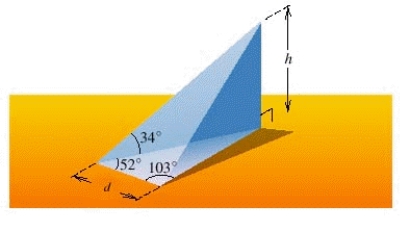 Approximate h, if
Approximate h, if  .
.
A) 4.9
B) 18.8
C) 18.4
D) 18.0
E) 17.6
 where B is the area of the base and h is the height of the prism.
where B is the area of the base and h is the height of the prism.  Approximate h, if
Approximate h, if  .
.A) 4.9
B) 18.8
C) 18.4
D) 18.0
E) 17.6

Unlock Deck
Unlock for access to all 25 flashcards in this deck.
Unlock Deck
k this deck
8
Represent the complex number geometrically. 
A)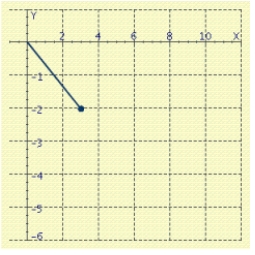
B)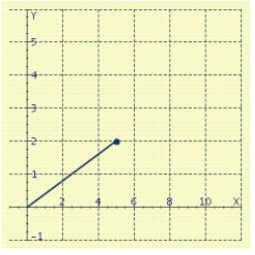
C)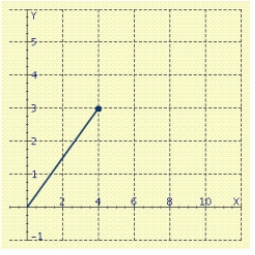
D)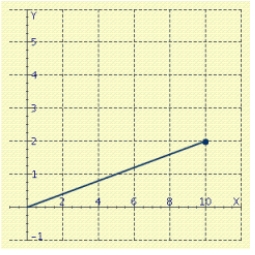
E)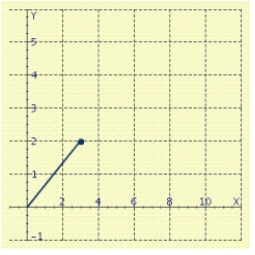

A)

B)

C)

D)

E)


Unlock Deck
Unlock for access to all 25 flashcards in this deck.
Unlock Deck
k this deck
9
Determine whether the given pair of vectors are orthogonal or not.  and
and 
A) no
B) yes
 and
and 
A) no
B) yes

Unlock Deck
Unlock for access to all 25 flashcards in this deck.
Unlock Deck
k this deck
10
Find 4a + 6b. a = < 5, - 4>, b = <6, 5 >
A) 4a + 6b = < 9, 12 >
B) 4a + 6b = < 61, 19 >
C) 4a + 6b = < 56, 14 >
D) 4a + 6b = < 36, 30 >
E) 4a + 6b = < 51, 24 >
A) 4a + 6b = < 9, 12 >
B) 4a + 6b = < 61, 19 >
C) 4a + 6b = < 56, 14 >
D) 4a + 6b = < 36, 30 >
E) 4a + 6b = < 51, 24 >

Unlock Deck
Unlock for access to all 25 flashcards in this deck.
Unlock Deck
k this deck
11
A straight road makes an angle of  with the horizontal. When the angle of elevation of the sun is
with the horizontal. When the angle of elevation of the sun is  , a vertical pole at the side of the road casts a shadow
, a vertical pole at the side of the road casts a shadow  feet long directly down the road, as shown in the figure.
feet long directly down the road, as shown in the figure. 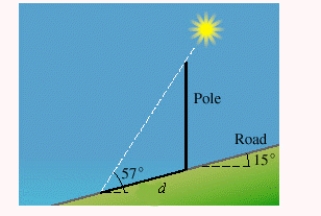 Approximate the length of the pole.
Approximate the length of the pole.
A) 94.60 ft
B) 94.90 ft
C) 62.67 ft
D) 94.00 ft
E) 95.50 ft
 with the horizontal. When the angle of elevation of the sun is
with the horizontal. When the angle of elevation of the sun is  , a vertical pole at the side of the road casts a shadow
, a vertical pole at the side of the road casts a shadow  feet long directly down the road, as shown in the figure.
feet long directly down the road, as shown in the figure.  Approximate the length of the pole.
Approximate the length of the pole.A) 94.60 ft
B) 94.90 ft
C) 62.67 ft
D) 94.00 ft
E) 95.50 ft

Unlock Deck
Unlock for access to all 25 flashcards in this deck.
Unlock Deck
k this deck
12
Solve 

A)
B)
C)
D)
E) No triangle exists


A)

B)

C)

D)

E) No triangle exists

Unlock Deck
Unlock for access to all 25 flashcards in this deck.
Unlock Deck
k this deck
13
Find || a ||. a = - < 2, - 5 >
A)
B)
C)
D)
E)
A)

B)

C)

D)

E)


Unlock Deck
Unlock for access to all 25 flashcards in this deck.
Unlock Deck
k this deck
14
Two tugboats are towing a large ship into port, as shown in the figure. The larger tug exerts a force of 4,100 pounds on its cable, and the smaller tug exerts a force of 3,500 pounds on its cable. 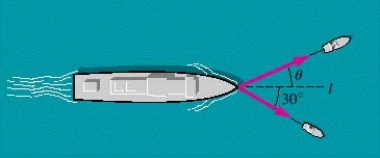 If the ship is to travel on a straight line l, approximate the angle
If the ship is to travel on a straight line l, approximate the angle  that the larger tug must make with l.
that the larger tug must make with l.
A)
B)
C)
D)
E)
 If the ship is to travel on a straight line l, approximate the angle
If the ship is to travel on a straight line l, approximate the angle  that the larger tug must make with l.
that the larger tug must make with l.A)

B)

C)

D)

E)


Unlock Deck
Unlock for access to all 25 flashcards in this deck.
Unlock Deck
k this deck
15
Approximate the area of a parallelogram that has sides of lengths a and b (in feet) if one angle at a vertex has measure  .
. 

A) 95.2
B) 110.3
C) 89.3
D) 88.4
E) 92.6
 .
. 

A) 95.2
B) 110.3
C) 89.3
D) 88.4
E) 92.6

Unlock Deck
Unlock for access to all 25 flashcards in this deck.
Unlock Deck
k this deck
16
Given that  , find the number.
, find the number. 
A) -30
B) -60
C) 38
D) -42
E) 18
 , find the number.
, find the number. 
A) -30
B) -60
C) 38
D) -42
E) 18

Unlock Deck
Unlock for access to all 25 flashcards in this deck.
Unlock Deck
k this deck
17
Find (a) the dot product of the two vectors and (b) the angle between the two vectors.  and
and 
A)
B)
C)
D)
E)
 and
and 
A)

B)

C)

D)

E)


Unlock Deck
Unlock for access to all 25 flashcards in this deck.
Unlock Deck
k this deck
18
Find (a) the dot product of the two vectors and (b) the angle between the two vectors.  and
and 
A)
B)
C)
D)
E)
 and
and 
A)

B)

C)

D)

E)


Unlock Deck
Unlock for access to all 25 flashcards in this deck.
Unlock Deck
k this deck
19
Solve 

A)
B)
C)
D)
E) No triangle exists


A)

B)

C)

D)

E) No triangle exists

Unlock Deck
Unlock for access to all 25 flashcards in this deck.
Unlock Deck
k this deck
20
If c represents a constant force, find the work done if the point of application of c moves along the line segment from P to Q.  and
and 
A) 48
B) 12
C) -24
D) -12
E) 21
 and
and 
A) 48
B) 12
C) -24
D) -12
E) 21

Unlock Deck
Unlock for access to all 25 flashcards in this deck.
Unlock Deck
k this deck
21
Use De Moivre's theorem to change the given complex number to the form  , where
, where  and
and  are real numbers.
are real numbers. 
A)
B)
C)
D)
E)
 , where
, where  and
and  are real numbers.
are real numbers. 
A)

B)

C)

D)

E)


Unlock Deck
Unlock for access to all 25 flashcards in this deck.
Unlock Deck
k this deck
22
Find the four fourth roots of  .
.
A)
B)
C)
D)
E)
 .
.A)

B)

C)

D)

E)


Unlock Deck
Unlock for access to all 25 flashcards in this deck.
Unlock Deck
k this deck
23
Use De Moivre's theorem to change the given complex number to the form  , where
, where  and
and  are real numbers.
are real numbers. 
A) 4,096
B) -24+24i
C) 2,048
D) -4,096i
E) -2,048i
 , where
, where  and
and  are real numbers.
are real numbers. 
A) 4,096
B) -24+24i
C) 2,048
D) -4,096i
E) -2,048i

Unlock Deck
Unlock for access to all 25 flashcards in this deck.
Unlock Deck
k this deck
24
The trigonometric form of complex numbers is often used by electrical engineers to describe the current I, voltage V, and impedance Z in electrical circuits with alternating current. Impedance is the opposition to the flow of current in a circuit. Most common electrical devices operate on 115-volt, alternating current. The relationship among these three quantities is  . The real part of I represents the actual current delivered to an electrical appliance in amps. Approximate this current when
. The real part of I represents the actual current delivered to an electrical appliance in amps. Approximate this current when  and
and  , and express the answer in rectangular form to two decimal places.
, and express the answer in rectangular form to two decimal places.
A) 2.76 amps
B) 1.33 amps
C) 1.23 amps
D) 1.38 amps
E) 1.45 amps
 . The real part of I represents the actual current delivered to an electrical appliance in amps. Approximate this current when
. The real part of I represents the actual current delivered to an electrical appliance in amps. Approximate this current when  and
and  , and express the answer in rectangular form to two decimal places.
, and express the answer in rectangular form to two decimal places.A) 2.76 amps
B) 1.33 amps
C) 1.23 amps
D) 1.38 amps
E) 1.45 amps

Unlock Deck
Unlock for access to all 25 flashcards in this deck.
Unlock Deck
k this deck
25
Use De Moivre's theorem to change the given complex number to the form  , where
, where  and
and  are real numbers.
are real numbers. 
A)
B)
C)
D)
E)
 , where
, where  and
and  are real numbers.
are real numbers. 
A)

B)

C)

D)

E)


Unlock Deck
Unlock for access to all 25 flashcards in this deck.
Unlock Deck
k this deck


